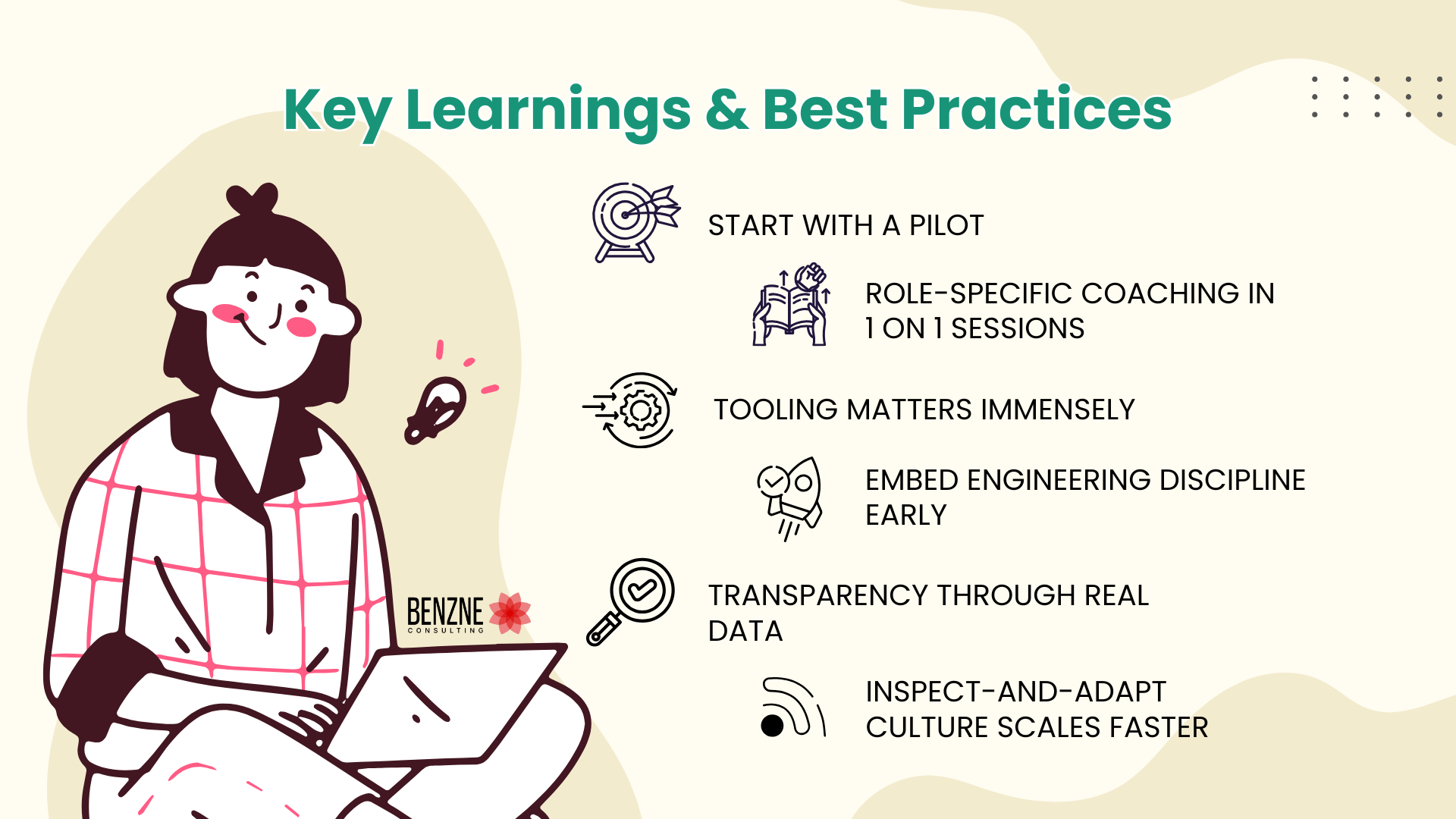Executive Summary
Our Client is India’s fastest-growing cryptocurrency exchange, rapidly scaling its engineering processes to drive faster, build higher‑quality delivery in a volatile market, and was struggling to keep up with a structured approach for sustainable development and inter-team hastles. With teams distributed across the country, crypto still considered as an unorganized market with frequent regulatory changes, and competitive customer expectations due to volatility and faster returns on investment, they required Agile transformation to bring harmony in their environment which is fully remote, technology-led startup.
Benzne Consulting partnered with them to:
- Understand the current flow
- Identify their bottlenecks
- Carefully select the pilot project to initiate the change
- Once we managed to contain success then we scaled Agile practices across 7 more teams which were catering the core components of their platform i.e. crypto exchange.
Through role-based coaching, continuous inspect and adapt loops, just-enough tool optimization, and cultural embedding of Agile mindset, the firm achieved uniform Agile maturity within and across the teams, improved estimation errors, predictable delivery within iterations & committed releases, and reliable product quality. This transformation built around fluidity of work across teams which demands self-managing traits, data-driven decision making with a strong sense of empiricism powering confidence in an industry which was a new territory not just for us but the entire market.
1. Problem Definition
Client Context:
- A dynamic crypto exchange startup which was the first of its kind in the Indian market which is seeing the flush of money from millennials and Gen Z, pushing the boundaries of financial technology in India. The expectation was pretty precise in terms of business continuity – fast innovation, real-time features, and minimal downtime were mission-critical.
- Entirely remote workforce, with engineers, product owners, and leadership distributed across regions and a very strong request to not bombard engineering with too many meetings and hence maximise their productive time.
Challenges Identified:
- Agile approaches existing were having ad hoc Scrum attempts but no clear cadence and it was primarily a collection of knowledge of all who have joined the team.
- Frequent deployment lacked structured planning hence increased bug risks in sensitive trading contexts.
- Tracking or reporting was not there and the leadership struggled to gauge progress against the product roadmap and lacked alignment.
- Marketplace volatility and regulatory uncertainty required teams to pivot quickly triggered inefficiencies and teams were throwing their plan out of window when the order comes from the top
These constraints meant the organization could neither guarantee feature delivery timelines nor sustain ongoing product quality which would lead to jeopardizing the user’s trust and competitive positioning against budding exchanges.
2. Transformation Journey: Benzne Agile Consulting Solution
2.1 Pilot Launch & Scrum Adoption
- Initiated pilot with a couple of high-priority product teams to demonstrate the possibility of expected demands and spiking efficiency.
- Discussed bottlenecks with teams, trained team members on probable resolutions, conducted foundational agile and Scrum practices, and focused on the need for timeboxed delivery and continuous feedback.
- Established a two-week sprint cycle, sprint review, retrospective routines, and backlog refinement as the foundation for cadence and delivery predictability.
- While teams has habit of over-committing due to piling pressure and hence quality needs to be guarded by effective Definition of Done and maker-checker process
2.2 Role-Based Coaching & Team Scaling
- Coordinated role-specific coaching for ~50 engineers across 7+ teams covering Scrum Masters (who couldn’t be dedicated but one of the development team member), Product Owners (due to constraint they were also shared among many teams), and Engineering Managers (who were also doing development along with leading their teams)
- Reinforced practices like refinements, definition of done (DoD), estimation techniques, and backlog prioritization in the most simplistic and apt way
- Ensured consistency in ceremonies and data reporting across all teams to harmonize practices and at the same time we encouraged autonomy with key focus on excellence not on processes and practices
2.3 Tooling & Process Enhancements
- Leveraged advanced JIRA best practices:
- Identified gaps in the as-is practice of jira and documented a practice that will be applied throughout the organization and trained everyone
- Identified a gradual transition approach to move to new agreements
- Configured board structures to reflect story flow, swim lanes, and status transparency
- Automated reporting through jira automation features, introduced dashboards with informative gadgets helped in displaying velocity trends, commitment variance, and sprint progress.
- Implemented Confluence for collaborative documentation, retrospectives, and asynchronous brainstorming which is key for remote context.
- Introduced requirements breakdown and estimation techniques like story slicing, time-boxed estimation, relative sizing and planning poker approach to reduce ambiguity and speed planning
2.4 Engineering Discipline & Quality Practices
- Embedded core engineering methods like unit test coverage, pair programming for few sprint items, and CI/CD pipelines to reduce defects and increase delivery cadence
2.5 Metrics & Transparency Culture
- Coaches guided teams to interpret metrics:
- Velocity, scope creep, and commitment accuracy.
- Risk dashboards to track impediments and dependencies.
- Teams used data to drive retrospectives, root-cause analysis, and continuous improvement dialogues.
2.6 Cultural Embedding & Inspect‑Adapt Practices
- Established a culture of “inspect-and-adapt” via regular retrospectives with teams and leadership
- Shared executive summaries and PI-level dashboards with senior leadership ensuring alignment and boosting stakeholder confidence
- Encouraged cross-functional collaboration through scheduled sync-ups and asynchronous stand‑ups
2.7 Sustainability & Continuous Iteration
- After initial adoption, Benzne transitioned to an embedded coaching model where we built internal competency and passed the reins to the identified champions who will further support product delivery, new initiatives, and further scaling, where we were there to guide and mentor, as and when needed
3. Solution Summary
| Intervention Area | What Benzne Did? | Outcome & Benefit |
| Scrum Pilot Launch | Introduced Scrum framework in pilot team | Demonstrated agility value, built confidence |
| Role-Based Coaching | Coached 50+ engineers across roles | Consistency across function, improved clarity in roles |
| JIRA & Tools Optimization | Structured boards, dashboards, and tracking | Real-time visibility, data-driven decision-making |
| Engineering Practices | Unit testing, pair programming, CI/CD deployment | Higher code quality, faster release confidence |
| Metrics & Retrospectives | Velocity, risk dashboards; structured retrospectives | Continuous improvement and learning loops |
| Culture & Scaling | Embedded Agile mindset into remote, fast-paced environment | Long-term delivery consistency, ownership, and accountability |
4. Outcomes and Business Impact
- All seven cross-functional teams onboarded to a standardized approach which has scope for flexibility and consistency in ceremonies
- Eliminated ad hoc behavior and bridged discrepancies in delivery and different roles resulting in better bonds and respect for process changes or you may say agreed-upon norms
- Predictable, incremental delivery assured timely adherence to evolving regulatory requirements
- Teams reportedly saw 25–30% improved estimation accuracy (reduced commitment variance), leading to better planning and allocation across distributed teams
- Implementation of unit testing, peer programming, and CI/CD pipelines resulted in a measurable decline in production bugs and accelerated release cycles.
- Tools like JIRA and Confluence, along with continuous collaboration on Slack enabled high visibility and smoother coordination across locations.
- Teams leveraged dashboards to manage backlog, track impediments, and inform sprint commitments
- Leadership was satisfied with individual team and multi-team level reporting and was able to make collective decisions
- Retrospectives led to tangible workflow changes
- Engineers transitioned to self-managing teams as we were mindful of not increasing the meeting times and maximising the productive time and this resulted in exhibiting ownership and collective accountability, enhancing morale and team cohesion in a remote context
5. Key Learnings & Best Practices

- Start with a pilot and anchor change in low-risk settings to win trust and create a natural pull in the system instead of pushing every to use certain practices
- Role-specific coaching in 1 on 1 sessions helps them to see the visible change in their skills and teams response
- Tooling matters immensely but at the same time it needs to be easy to learn and use and creating well-structured kanban or scrum boards, dashboards, and backlog workflows help distributed teams stay aligned
- Embed engineering discipline early
- Transparency through real data is more acceptable than motivational speech as it builds trust between teams and leadership and supports predictability in delivery
- Inspect-and-adapt culture scales faster when retrospectives lead to visible action and at least one of the improvement could be successfully experienced by the teams
6. Conclusion & Next Steps
In a high-stakes industry like cryptocurrency, agility is not optional. Benzne Consulting’s expert-led transformation partners with a digital native startup to curate a conducive environment where innovation is not backseated by process albeit it is encouraged, engineering rigour is accelerated, and transparency is paramount. Building a data-first culture despite remote working and rapid scaling is foundational to any transformation.
If your organization seeks consistent, scalable, and resilient Agile maturity, particularly in domains requiring both speed and regulatory compliance, reach out to Benzne Consulting. Together, we will help you transition from ad hoc to align through delivering continuous business value with confidence and accountability.
Call to Action
Ready to begin your Agile transformation? Contact us to explore how Benzne can help your teams become self-managing, data-driven, and high-performing—in a remote-first or hybrid world.

